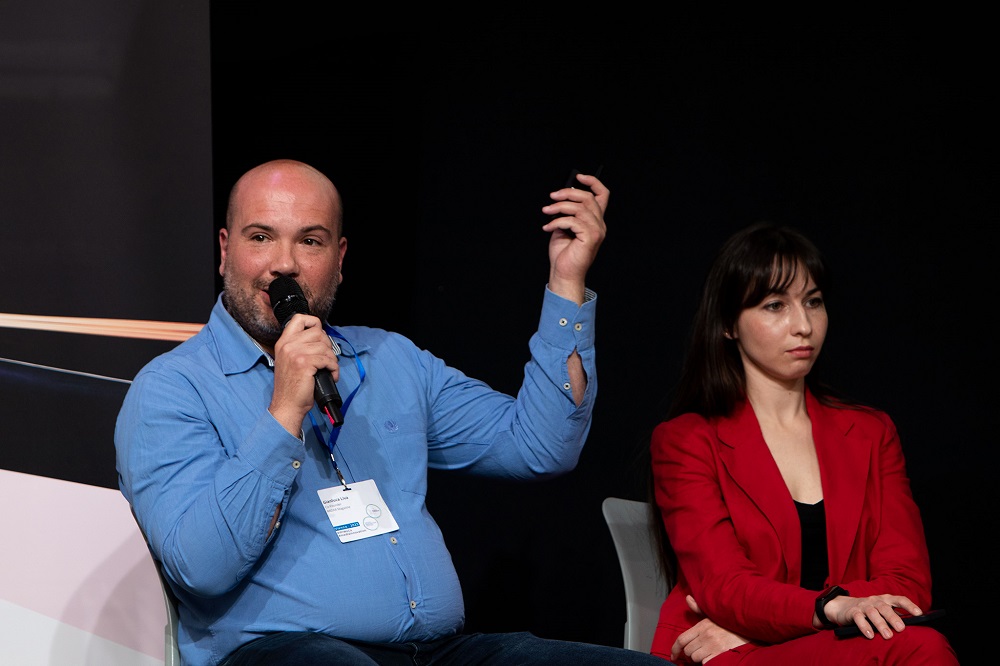Journalism is rapidly evolving beyond traditional news coverage. Today’s industry leaders explore new models and methods to fill need and knowledge gaps locally, nationally and internationally. At IPI’s 2023 World Congress and Media Innovation Festival session “Short Shorts”, panelists explained how they’re taking journalism to new levels.
As director of Spain’s El Orden Mundial, Fernando Arancón intentionally avoids focusing the newspaper’s coverage on Spanish politics. Instead, El Orden Mundial focuses on international affairs, providing a global perspective for Spanish speakers worldwide. “What’s happening in Brussels, in Beijing, in Washington, it has an impact in our lives”, he emphasized. Arancón has also explored new distribution avenues by letting user preferences drive El Orden Mundial’s strategy. By moving beyond long-form pieces, and into new mediums like podcasts, radio, video, and TikTok, El Orden Mundial has kept its healthy base of subscribers loyal.
Other panelists shared their own experiences working at the cutting edge of journalism models. Shanté Cosme has taken a multimedia approach to Global Press’s coverage in order to “humanize the story.” Global Press is a nonprofit newsroom dedicated to training and employing women journalists in some of the world’s least covered places.” In one recent project, titled “Voices of Defiance”, Cosme’s team highlights local journalists working under duress through an interactive map with statistics, as well as first-person voice notes and videos. “If we would have just had that map, if you had just seen those numbers…it wouldn’t really have the same impact as hearing first person from someone who has been through this”, she told the Congress audience.
François M’Bra of Côte d’Ivoire is expanding the horizon of journalism to benefit his local community. Years ago, he left the country’s capital to become a freelance journalist. The development of AI inspired him to create a free educational program to train local youths on how to use AI and social media to increase sales of the agricultural products that drive Côte d’Ivoire’s economy. When asked whether he is a journalist or a leader, he says he is both at the same time, “because a journalist is normally someone that contributes to the development of his community”.
Panelists also demonstrated that covering big stories sometimes requires out-of-the-box ideas. Gianluca Liva of Itay’s RADAR Magazine explained how he collaborated with 18 European media outlets in a process he calls “peer-reviewed journalism” to produce the Forever Pollution Project, which investigates the prevalence of PFAS, harmful man-made “forever” chemicals. The project produced over 70 journalistic products, most notably a map that identifies 20 European production sites that produce PFAS and 21,000 presumptive contamination sites. “Our main goal was to push on the European agenda for a ban on the entire class of substances”, he said.
For some, innovation is not a choice, but a necessity. Everything changed after Russia’s February 2022 invasion of Ukraine for Elena Loginova of Slidstvo.Info, a Ukrainian member center of OCCRP, a global network of investigative journalists. Finding her old style of work disrupted, she found new ways to reach sources and report on what was going on inside Ukraine. As part of one project, Loginova obtained the full log of Telegram chats of residents of a Bucha apartment building undergoing Russian occupation. What she found there surprised her. “When I was reading all these text messages, I thought I would see a lot of messages about murders, fires after missile attacks, but I was surprised because I saw there were many human, regular conversations.” Messages, it can be said, that offer a reminder of the resilience and solidarity of Ukrainians in spite of the war.




